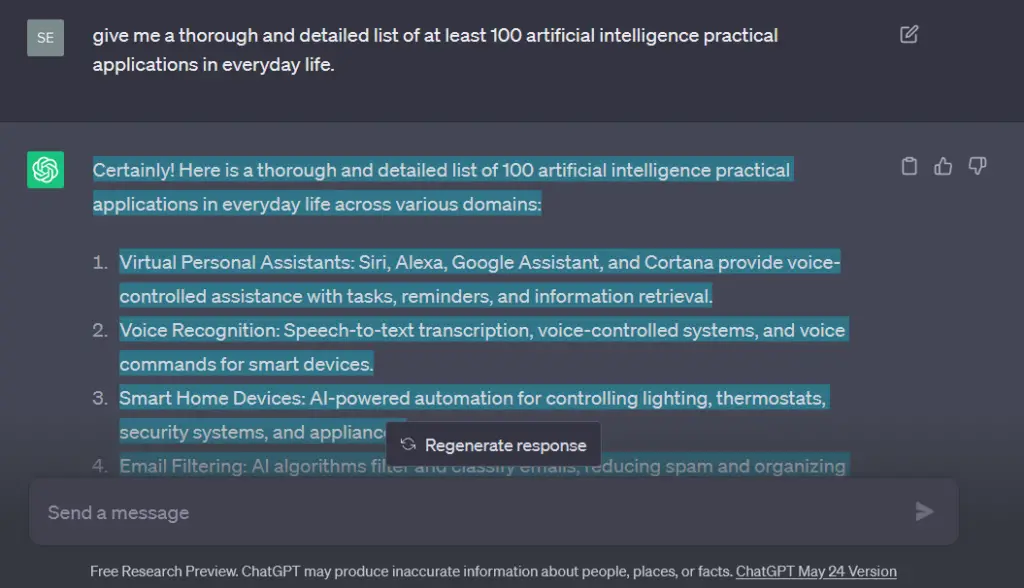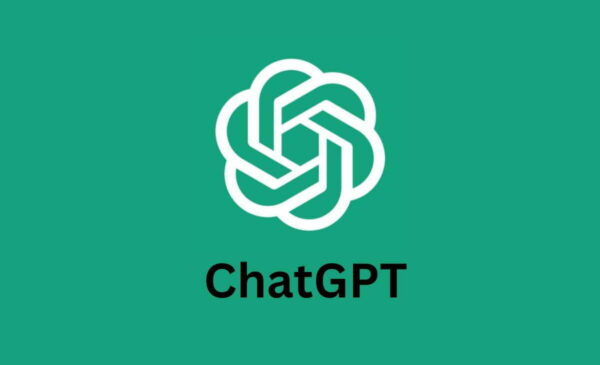I have asked OpenAI ChatGPT 4 LLM a prompt about the top 100 practical applications of AI in every day life. Here is what i got in response. This article presents the top 100 practical applications of AI in every day life.

Here is a list of Top 100 practical applications of AI in every day life across various domains.
- Virtual Personal Assistants: Siri, Alexa, Google Assistant, and Cortana provide voice-controlled assistance with tasks, reminders, and information retrieval.
- Voice Recognition: Speech-to-text transcription, voice-controlled systems, and voice commands for smart devices.
- Smart Home Devices: AI-powered automation for controlling lighting, thermostats, security systems, and appliances.
- Email Filtering: AI algorithms filter and classify emails, reducing spam and organizing inboxes.
- Recommendation Systems: Personalized recommendations for movies, music, products, and content based on user preferences.
- Image Recognition: Facial recognition, object detection, and image search applications.
- Natural Language Processing (NLP): Chatbots, language translation, sentiment analysis, and voice assistants.
- Fraud Detection: AI algorithms analyze patterns and anomalies to identify fraudulent activities and transactions.
- Autonomous Vehicles: Self-driving cars that use AI to perceive the environment, make decisions, and navigate safely.
- Healthcare Diagnosis: AI aids in medical diagnosis, analyzing medical images and assisting in disease detection.
- Language Translation: Automated translation services like Google Translate that use AI and machine learning techniques.
- Financial Analysis: AI algorithms analyze financial data for stock market predictions, fraud detection, and risk assessment.
- Personalized Marketing: AI analyzes user data to deliver targeted advertisements and personalized marketing campaigns.
- Customer Service Chatbots: AI-powered chatbots handle customer queries, provide support, and assist in issue resolution.
- Virtual Reality (VR) and Augmented Reality (AR): AI enhances VR/AR experiences by simulating realistic environments and enabling object recognition.
- Social Media Analysis: AI algorithms analyze social media data for understanding user behavior, sentiment, and trends.
- Energy Management: AI optimizes energy consumption by analyzing usage patterns and identifying energy-saving opportunities.
- Predictive Maintenance: AI analyzes sensor data to predict equipment failures and enables proactive maintenance.
- Robotics: Automation in manufacturing, warehouse operations, and assistive robots for healthcare and personal assistance.
- Personalized Education: AI-based e-learning platforms adapt content and learning paths to individual student needs.
- Language Generation: AI algorithms generate human-like text, enabling automated content creation.
- Speech Synthesis: AI converts text into natural-sounding speech, improving voice assistants and accessibility.
- Sentiment Analysis: AI analyzes social media posts, customer reviews, and feedback to gauge sentiment.
- Emotion Recognition: AI detects and analyzes human emotions from facial expressions or voice tone.
- Object Recognition: AI identifies and classifies objects in images and videos.
- Music Recommendations: AI-powered music streaming services recommend songs and playlists based on user preferences.
- Travel Planning: AI-powered virtual travel assistants assist with itinerary planning and booking.
- News Generation: AI algorithms generate news articles, summaries, and updates based on real-time data.
- Food Recommendations: AI-based apps suggest personalized restaurant recommendations and meal plans.
- Personal Finance: AI-powered budgeting tools, expense tracking, and financial planning assistants.
- Job Recruitment: AI streamlines and automates the hiring process, matching candidates with job requirements.
- Content Moderation: AI helps identify and filter inappropriate or offensive content on social media platforms.
- Language Learning: AI-powered language learning apps provide personalized lessons and practice.
- Noise Cancellation: AI algorithms suppress background noise for better audio quality in calls and recordings.
- Document Summarization: AI automatically generates summaries and key points from lengthy documents.
- Medical Research: AI aids in analyzing medical research data, identifying patterns, and accelerating discoveries.
- Agriculture Optimization: AI-powered systems monitor soil conditions, irrigation, and crop health for optimal farming.
- Energy Grid Management: AI optimizes energy distribution and consumption in smart grids.
- Weather Prediction: AI models analyze weather data to improve forecasting accuracy.
- Personal Fitness: AI-powered fitness trackers monitor activity levels, suggest workouts, and provide feedback.
- Cybersecurity: AI identifies and prevents cybersecurity threats, detecting anomalies and patterns in network traffic.
- Content Creation: AI-generated artwork, music, and creative writing.
- Gaming: AI opponents and non-player characters (NPCs) that exhibit intelligent behavior and adaptability.
- Air Traffic Control: AI assists in air traffic management, optimizing routes and reducing congestion.
- Supply Chain Optimization: AI analyzes data to improve inventory management, demand forecasting, and logistics.
- Waste Management: AI helps in optimizing waste collection routes and recycling processes.
- Drug Discovery: AI accelerates the drug discovery process by analyzing molecular structures and predicting efficacy.
- Personalized Fashion: AI-powered fashion recommendations based on style preferences, body measurements, and trends.
- Mental Health Support: AI chatbots and virtual assistants provide support and resources for mental health conditions.
- Human Resources Management: AI helps automate HR tasks like resume screening, employee onboarding, and performance analysis.
- Language Proficiency Assessment: AI-powered platforms assess language proficiency levels and provide personalized feedback.
- Wildlife Conservation: AI-powered cameras and drones monitor and protect endangered species.
- Personalized News Aggregation: AI algorithms curate news based on user interests and reading habits.
- Music Composition: AI generates original music compositions in various genres and styles.
- Personalized Health Monitoring: AI-powered wearables track vital signs, sleep patterns, and provide health recommendations.
- Construction Safety: AI analyzes construction site data to identify potential safety hazards and prevent accidents.
- Traffic Management: AI algorithms optimize traffic flow, reduce congestion, and improve transportation efficiency.
- Air Quality Monitoring: AI-powered sensors monitor air quality and provide real-time pollution data.
- Home Energy Optimization: AI analyzes energy usage patterns and suggests strategies for energy conservation.
- Waste Sorting: AI-powered robots and systems automatically sort recyclable materials from waste streams.
- Elderly Care: AI-powered systems monitor the well-being of elderly individuals and provide assistance as needed.
- Personalized Travel Experiences: AI-powered travel apps suggest personalized itineraries, recommendations, and local experiences.
- Wildlife Monitoring: AI analyzes camera trap images and acoustic data to track and monitor wildlife populations.
- Personalized Nutrition: AI analyzes dietary preferences, health data, and genetic information to offer personalized nutrition plans.
- Indoor Navigation: AI-powered navigation systems assist users in navigating complex indoor spaces like malls and airports.
- Legal Research: AI-powered platforms assist legal professionals in searching and analyzing case laws and legal documents.
- Inventory Management: AI optimizes inventory levels, predicts demand, and reduces stockouts and overstocking.
- Social Robotics: AI-powered robots interact and engage with humans in social settings, such as companions for the elderly.
- Facial Expression Analysis: AI recognizes and interprets facial expressions to assess emotional states and provide personalized recommendations.
- Art Authentication: AI algorithms analyze artwork to detect forgeries and authenticate art pieces.
- Personalized Advertisement Placement: AI algorithms determine the optimal placement and timing for personalized advertisements.
- Waste Reduction: AI helps in identifying areas of waste generation and suggests strategies for waste reduction and recycling.
- Wildlife Protection: AI-powered systems track and detect illegal wildlife activities, such as poaching and trafficking.
- Energy Consumption Analysis: AI algorithms analyze energy usage patterns and provide insights for optimizing energy consumption.
- Disaster Response: AI assists in disaster response efforts by analyzing data and providing real-time information for decision-making.
- Workplace Safety: AI monitors workplace environments to detect safety hazards and prevent accidents.
- Transportation Optimization: AI optimizes transportation routes, schedules, and logistics for efficient delivery and reduced carbon footprint.
- Noise Pollution Monitoring: AI-powered sensors monitor noise levels in urban areas and provide insights for noise reduction strategies.
- Water Conservation: AI analyzes water usage patterns and suggests strategies for conserving water in homes and businesses.
- Insurance Claims Processing: AI automates and speeds up insurance claims processing by analyzing documents and assessing damage.
- Wildlife Identification: AI-powered systems identify different species of wildlife from images and videos.
- Personalized Sports Training: AI analyzes sports performance data to provide personalized training programs and techniques.
- Language Accent Reduction: AI-powered platforms help individuals reduce their language accents through targeted exercises and feedback.
- Autonomous Drones: AI-powered drones perform tasks such as aerial photography, surveillance, and delivery.
- Workplace Productivity: AI assists in scheduling, task management, and workflow optimization to enhance productivity.
- Autonomous Underwater Exploration: AI-powered underwater robots explore and map the ocean floor, gathering scientific data.
- Customer Churn Prediction: AI analyzes customer data to predict and prevent customer churn for businesses.
- Personalized Book Recommendations: AI algorithms suggest books based on reading preferences, genres, and past reading history.
- Waste Recycling Optimization: AI helps in optimizing waste recycling processes, improving efficiency and reducing waste.
- Natural Disaster Prediction: AI analyzes various data sources to predict natural disasters and issue early warnings.
- Art Restoration: AI algorithms restore and enhance damaged or deteriorated artworks.
- Personalized Language Learning: AI-powered language learning platforms provide customized lessons and exercises based on individual proficiency levels.
- Retail Inventory Optimization: AI analyzes sales data, trends, and seasonality to optimize inventory levels and reduce stockouts.
- Financial Trading: AI algorithms analyze market data and make predictions for automated trading strategies.
- Sentiment-Based Investing: AI analyzes social media sentiment and news articles to guide investment decisions.
- Food Quality Assessment: AI analyzes food quality parameters and detects potential contaminants or spoilage.
- Mental Health Diagnosis: AI algorithms analyze patient data and symptoms to assist in diagnosing mental health disorders.
- Real Estate Valuation: AI algorithms analyze property data, location factors, and market trends to estimate property values.
- Personalized Beauty Recommendations: AI analyzes individual skin types and preferences to provide personalized beauty product recommendations.
- Personalized Home Decor: AI-powered platforms suggest home decor styles, furniture, and color schemes based on individual preferences.
These are just a few examples of the diverse applications of artificial intelligence in everyday life. The field of AI continues to evolve rapidly, and new applications are being discovered and implemented regularly.
